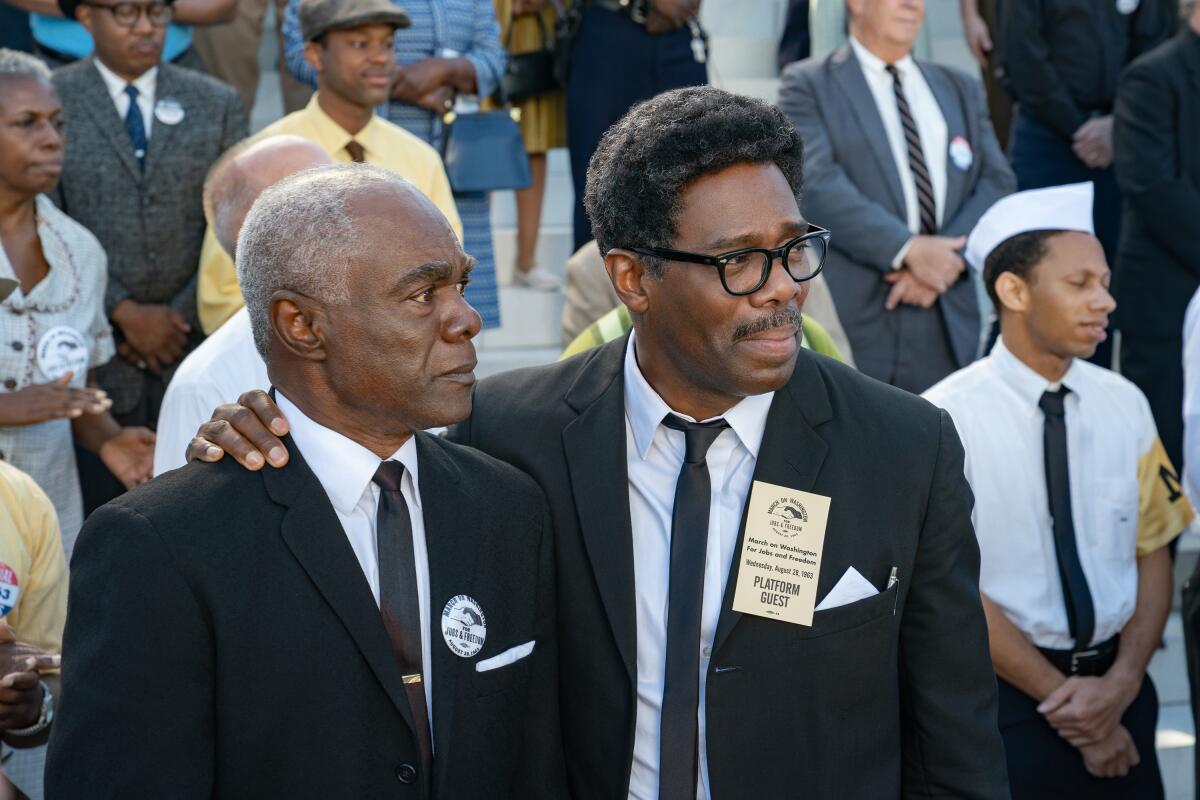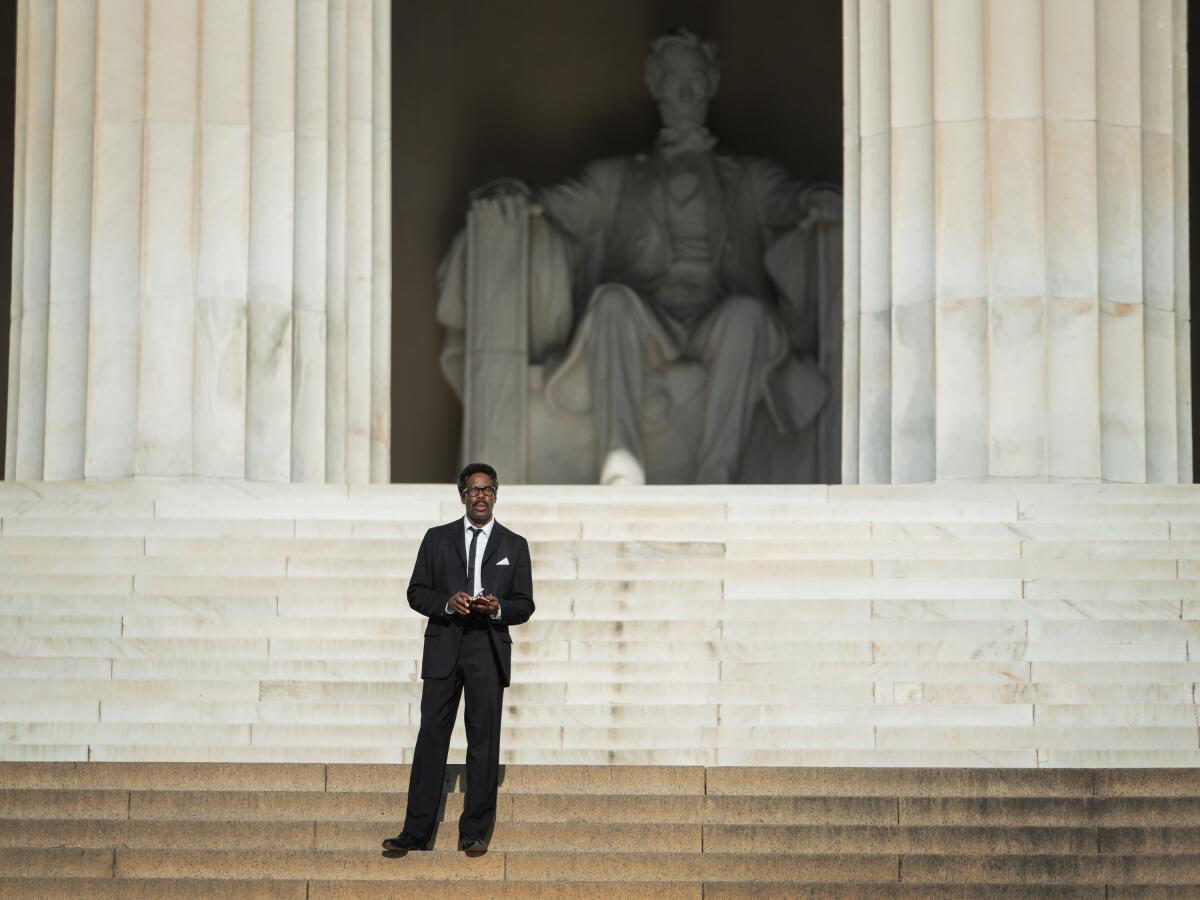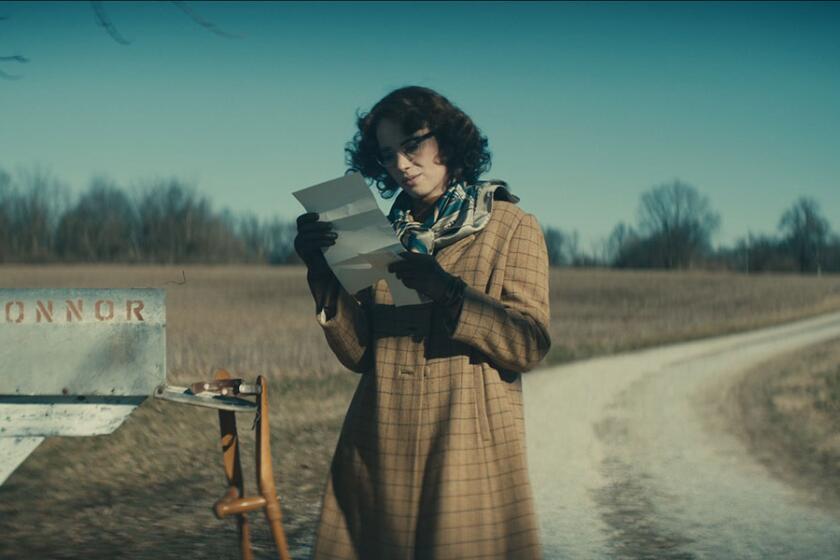‘Nyad,’ ‘Rustin’ and ‘Wildcat’: The Telluride biopic, three ways

- Share via
TELLURIDE, Colo. — Before this year’s strike-impacted fall movie season got under way, some of us wondered if, of all the major August/September festivals, Telluride might be the one least visibly impacted by the absence of Hollywood actors. The Venice and Toronto film festivals would of course see a serious dip in star wattage; the former even lost its opening-night film, Luca Guadagnino’s “Challengers,” when it became clear that stars like Zendaya and Josh O’Connor couldn’t walk the red carpet. But there was reason to hope that Telluride, the rare low-key event where celebrities can typically blend into a mercifully paparazzi-free crowd, might feel the pain less acutely.
Now, a few days into the festival, these speculations have proven only half true. For one, a few actors actually are in attendance here, including Emma Stone (“Poor Things”) and Julia Louis-Dreyfus (“Tuesday”), though they’re keeping a scrupulously low profile. Others were granted interim agreements to appear and promote their work, like Maya Hawke, star of the Flannery O’Connor biopic “Wildcat” (more on that in a bit), and Dakota Johnson, the star of Christy Hall’s two-souls-in-a-taxi talkfest, “Daddio.” The epitome of low-budget high concept, this impressively sustained but often irritatingly overwritten real-time exercise features an ever-assured Johnson as a streetwise young traveler and Sean Penn as her very loquacious cab driver. If you can believe she would stay in the car without bolting after five minutes, you might well be moved by the journey’s long-deferred destination.
Otherwise, the dearth of actors standing in front of movie screens and microphones has certainly registered. The pre-screening intros and post-screening Q&As have been shorter, more subdued, almost entirely director-focused affairs. All three of the festival’s career tributes are going to filmmakers (Yorgos Lanthimos, Wim Wenders and Alice Rohrwacher). Were the strikes not happening, at least one of these tributes would likely have been presented to a veteran actor with a movie in the lineup.

Could one of those actors have been Annette Bening, the star of the slickly inspirational, controversy-ridden biopic “Nyad”? Maybe so, since Telluride’s tributes are often calculated to maximize an actor’s awards prospects, and “Nyad,” about the marathon swimmer Diana Nyad, is clearly being set up as Bening’s latest shot at an Oscar. Whether that bid will prove successful is best left for others to speculate, though it seems safe to say that the movie, which Netflix will release later this fall, faces a more uphill battle than most. The image of Nyad that has emerged in recent weeks, as reported in an in-depth piece by my Times colleague Josh Rottenberg, is of a remarkable athlete with a history of exaggerating her many achievements — a self-aggrandizing scourge of the marathon swimming community.
That’s a more complicated and interesting portrait than the one proffered by the movie, even if Bening and the screenwriter Julia Cox do take pains to emphasize Nyad’s pain-in-the-ass outspokenness, a quality that precisely no one seems to dispute. Watching “Nyad” in a vacuum, you’d gather that its real-life subject is stubborn and difficult, to the point of alienating the invaluable members of her support team; you wouldn’t suspect that she might be actively dishonest. The directors, Elizabeth Chai Vasarhelyi and Jimmy Chin, seem to have spent far more time worrying about the daunting physical logistics than the ethical implications of their selective portraiture.
But hey, let’s hear it for logistics. The impossibly grueling experience that Nyad put herself through again and again, as she made multiple attempts to complete a 110-mile swim from Cuba to Florida, is as queasily visceral as you’d want it to be, and sometimes more so. Vasarhelyi and Chin, previously at Telluride with the documentaries “Free Solo” and “The Rescue,” clearly have a gift for mining extreme sports for suspense and excitement. And strategically or not, they’ve ensured that the heart of the movie isn’t Bening’s performance as Nyad, strong and ferocious as it is, but rather Jodie Foster’s beautiful supporting turn as Bonnie Stoll, the swimmer’s longtime best friend and most faithful ally. It’s her heroic endurance you leave this movie thinking about.

Netflix may have an easier time wooing critics and voters with another Telluride-premiered biopic, “Rustin,” a straightforward but stirring portrait of the undersung civil rights activist Bayard Rustin (a forceful Colman Domingo). Directed by George C. Wolfe (“Ma Rainey’s Black Bottom”), the movie focuses on the fraught build-up to the March on Washington on Aug. 28, 1963, a milestone often memorialized in images of hundreds of thousands of Black citizens gathered before the Lincoln Memorial, where Mahalia Jackson sang and the Rev. Martin Luther King Jr. delivered his “I Have a Dream” speech. The movie’s achievement is to remind us that milestones are invariably the result of hard, often thankless work, preceded by conflict and marked by compromise.
The screenplay by Justin Breece and Dustin Lance Black (who won an Oscar for “Milk,” another portrait of activism in action) dramatizes a complex swirl of agendas and alliances, ideological rifts and irrepressible egos. At the center of this intersectional stew is Rustin, a gay Black man of Quaker faith whose persistence, charisma and lifelong devotion to pacifism make him one of the civil rights movement’s most important figures, even as the open secret of his sexuality made him a liability in the eyes of many of his fellow leaders, including King himself. (King is played by Aml Ameen; the ensemble includes Johnny Ramsey, Glynn Turman, Chris Rock, Jeffrey Wright, Gus Halper, Audra McDonald and CCH Pounder.)
Wolfe’s movie is most engrossing in its focus on ground-level planning, the extraordinary marshaling of resources it took to bring the March on Washington to fruition. It’s unfortunate that the actual march itself, dramatized with a wobbly mix of new and archival footage, should feel so truncated in a movie that inevitably foregrounds the man over the movement. Domingo runs the gamut from righteously withering tell-off speeches to anguished personal reckonings; it’s a stirring performance, if one that’s somewhat hindered by the narrative’s mostly foreseeable beats. Crucially, though, you believe in his Rustin as a divider of boardrooms and builder of coalitions, with a searing gift for galvanizing protesters into action.
Awards-seeking prestige biopics are invariably part of the mix at Telluride, which has minted more than its share of celebrity-impersonating Oscar winners. This is where audiences caught their first glimpse of Renée Zellweger as Judy Garland in “Judy” and Gary Oldman as Winston Churchill in “Darkest Hour,” . Given how automatically biopic performances are expected to be spun into awards gold, it was refreshing to encounter “Wildcat,” a thoughtful, prismatic drama about the life and writing of Flannery O’Connor that arrived in Telluride with little advance buzz. Directed by Ethan Hawke (who wrote the script with Shelby Gaines), it’s notably uninterested in rendering a Southern literary giant in easily legible, palatable, clip-reel-ready terms. One of the movie’s sharpest themes is that palatability has its artistic limitations.
A terrific Maya Hawke plays the young Mary Flannery O’Connor during her formative years as a writer — a tough period complicated by her relationship with her mother (Laura Linney), who can’t abide her daughter’s fascination with the caustic and grotesque, and the onset of the lupus that will eventually claim the author’s life at the age of 39. Crucially, though, “Wildcat” is most interested in O’Connor’s work itself, peppering its biographical narrative with dramatizations of her short stories, including “Parker’s Back,” “Revelation” and “Everything That Rises Must Converge.”
Telluride: Ethan and Maya Hawke and Laura Linney chat about their new Flannery O’Connor biopic ‘Wildcat’ and the complexities of the author’s life.
Weaving in and out of these stories with a playfulness that appreciably lightens the somber mood (in a clever meta-twist, Maya Hawke and Linney play a number of O’Connor’s characters), “Wildcat” spends some time unpacking its subject’s thorny relationship with religion: her belief in God, but also her rejection of easy grace. The movie also foregrounds the racism that she witnesses and pushes back against in her everyday Georgia life, in scenes that obliquely address (or, depending on your view, sidestep) the recent debate over racism in O’Connor’s work.
In his Telluride intro, Ethan Hawke proudly described himself as a “nepo father,” noting that his daughter Maya had hired him to direct and co-write the picture. But “Wildcat,” which will next screen at the Toronto International Film Festival and, at press time, is still seeking a distributor, also refutes the assumption that every family collaboration is a vanity project. It’s the seriousness of its ambitions and the intellectual heft of its engagement with its subject that makes this under-the-radar entry a must-see.
More to Read
Only good movies
Get the Indie Focus newsletter, Mark Olsen's weekly guide to the world of cinema.
You may occasionally receive promotional content from the Los Angeles Times.












